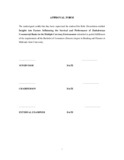Please use this identifier to cite or link to this item:
https://cris.library.msu.ac.zw//handle/11408/465| Title: | Insights into the factors influencing Zimbabwean commercial bank survival and performance in a multiple currency environment. | Authors: | Babi, Eric | Keywords: | Multiple currency environment | Issue Date: | 2014 | Publisher: | Midlands State University | Abstract: | A banking sector with improved bank performance and greater probability of bank survival creates a fertile ground for effective financial intermediation and economic growth. The main point of enquiry of this research was to unveil factors influencing survival and performance of Zimbabwean commercial banks after the adoption of the multiple currency exchange rate system. The study sought to draw insights on the financial and marketing strategies that are being employed by commercial banks. The other objective was to understand how commercial banks are mobilising deposits in the dollarized economy. An exploratory research design was adopted to accomplish most of the research’s objective. However, an explanatory research design was also adopted to complement the exploratory research in determining factors influencing variations in bank performance. Primary data was collected using interviews and questionnaires with head treasury, head credit risk, head marketing, head finance and head branch operations from twelve commercial banks that met the criterion of full scale operation since 2009. Secondary data was obtained from annual financial statements of banks under survey. Descriptive statistics were used to analyse the data with the aid of an econometric package (Stata 11) to analyse the determinants of bank performance. The research findings revealed that commercial banks are surviving by relying on offshore lines of credit, foreign direct investments, and deposits for their financing. It was also established that ownership, stock exchange listing, capitalisation, and being a membership of a bank holding company (BHC) is crucial for bank survival. From the survey, surviving banks are feeding on salary based loans, which have a low probability of default. In addition, banks have resorted to Corporate Social Responsibility (CSR) and rebranding activities to regain public confidence and improve deposit mobilisation. Results from a Generalised Least Squares (GLS) panel data regression revealed that bank performance in the multiple currency is determined by bank size, non-performing loans, capital adequacy, and the loan to deposit ratio. Average lending rate, inflation, and management efficiency were found to be statistically insignificant in influencing bank performance. The researcher conclude that bank survival and performance can be threatened by liquidity challenges and non-performing loans. Therefore, banks should be innovative, desist from overreliance on interest income, and create partnerships with foreign banks or companies to access cheaper financing. The government should recapitalise the central bank to resume its function as a lender of last resort to ease liquidity challenges. A credit reference bureau should be set up to address non-performing loans problems. | URI: | http://hdl.handle.net/11408/465 |
| Appears in Collections: | Bachelor Of Commerce Banking And Finance Honours Degree |
Files in This Item:
| File | Description | Size | Format | |
|---|---|---|---|---|
| ternit in document.pdf | 1.14 MB | Adobe PDF |  View/Open |
Page view(s)
228
checked on Feb 18, 2026
Download(s)
138
checked on Feb 18, 2026
Google ScholarTM
Check
Items in MSUIR are protected by copyright, with all rights reserved, unless otherwise indicated.



